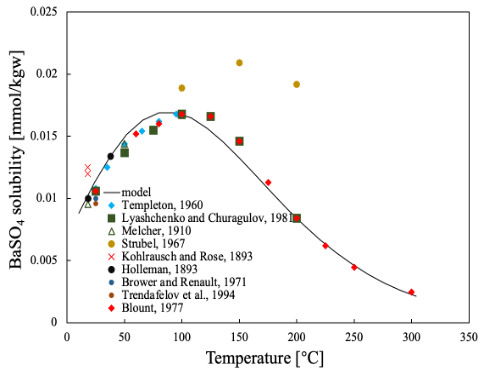Mineral scale formation is a common problem in some cases in geothermal energy production and in offshore oilfield operations. In the geothermal field, mineral deposition limits the degree of utilization of geothermal energy.
Injection of seawater for oil recovery can cause reduction in fluid production and injection rates, also serious damage on equipment.
The barium sulfate (BaSO4) is the most common and problematic scale. Prediction of solubility of BaSO4 in deep water relies on a thorough and accurate understanding of the thermodynamics of the dissolution processes at various temperatures and pressures encountered in oilfield.
While the solubility of BaSO4 have been reported in various sources, the values are usually consistent with each other under high temperature and high pressure. For prediction of solubility of BaSO4, the pressure dependence of many specific coefficients is typically unavailable due to lack of experimental data at pressure higher than atmosphere or water vapor.
The primary focus of this project is to develop an experimental procedure to determine the BaSO4 solubility in simulated natural water, covering a range of temperatures and pressures to represent the conditions found in geothermal and oil production wells.
Also, the extended UNIQUAC model is validated and further improved on the basis of both experimental data and values reported in the literature.

Main supervisor:
Philip Loldrup Fosbøl